It is a common tradition for the majority of graduate schools to mandate the submission of a statement of purpose, personal statement, curriculum vitae, or résumé from prospective students. In addition to these documents, applicants are expected to provide a letter of intent.
This letter functions as a scholarly self-portrait, detailing the sequence of academic experiences and milestones that have driven your pursuit of higher education. The emphasis of the letter should be placed on your academic journey, addressing pertinent questions and concerns that have shaped your aspirations and ambitions.
Table of Contents
What is a letter of intent for graduate school?

A letter of intent for graduate school is a formal written document that outlines an applicant’s interest, motivation, and goals for pursuing a specific program or degree at a graduate institution. It serves as an opportunity for the applicant to communicate their passion for the chosen field, highlight relevant experiences and achievements, and demonstrate how the program aligns with their career objectives.
The letter of intent also helps the admissions committee to evaluate the applicant’s fit with the program and to assess their potential for success in the academic environment. It typically includes information about the applicant’s academic background, research interests, professional experiences, and reasons for choosing the specific institution and program.
Letter of Intent for Graduate School Templates
Take the first step towards your academic goals with our comprehensive collection of Letter of Intent templates specifically tailored for graduate school applications. These templates provide a structured framework for expressing your passion, qualifications, and goals to admission committees, helping you stand out from the competition. Craft a compelling narrative about your academic journey, research interests, career aspirations, and why you believe the graduate program is the perfect fit for your ambitions.
Our customizable templates offer a professional format and guidelines to ensure your letter showcases your unique strengths and highlights your dedication to academic excellence. With our user-friendly templates, you can easily draft a persuasive and well-organized Letter of Intent that captures the attention of admissions officers. Increase your chances of securing admission to your dream graduate program by utilizing our Letter of Intent for Graduate School Templates and make a lasting impression on the decision-makers.
What is the purpose of a letter of intent for graduate school?
The purpose of a letter of intent for graduate school is to convey an applicant’s enthusiasm, motivation, and qualifications for a particular program or degree to the admissions committee. It serves several key functions:
Introduce the applicant: The letter of intent allows the applicant to present themselves, their background, and their academic and professional achievements in a concise and organized manner.
Showcase passion and motivation: The letter allows the applicant to express their passion for the chosen field, demonstrate their understanding of the subject, and explain why they are motivated to pursue advanced studies in that area.
Highlight relevant experiences: Applicants can use the letter of intent to discuss relevant research, work experiences, internships, or other accomplishments that have prepared them for graduate studies and contributed to their development in the field.
Establish program fit: The letter provides an opportunity for the applicant to explain why they believe the specific graduate program is an ideal match for their interests and goals, and how they can contribute to the academic community.
Explain career objectives: The applicant can use the letter to outline their short- and long-term career goals and explain how the graduate program will help them achieve these objectives.
Differentiate the applicant: By presenting a clear, well-articulated letter of intent, the applicant can set themselves apart from other candidates and make a lasting impression on the admissions committee.
Ultimately, the purpose of a letter of intent is to persuade the graduate school that the applicant is a strong candidate who would thrive in their program and contribute meaningfully to the academic community.
How long is a letter of intent for grad school?
A letter of intent for grad school typically ranges between 500 and 1,000 words, or one to two pages in length. However, the specific length requirement may vary depending on the institution or program you are applying to. It is essential to follow any guidelines provided by the graduate school regarding word count, formatting, and content.
When writing a letter of intent, it is important to be concise, focused, and well-organized. Clearly articulate your interests, experiences, and goals without being overly verbose or repetitive. Your letter should provide the admissions committee with a comprehensive understanding of your qualifications, motivations, and suitability for the program while adhering to any specified length requirements.
Letter of intent sections
A comprehensive letter of intent for graduate school typically includes the following sections:
Introduction:
Begin with a brief introduction that includes your name, the program you are applying to, and a statement expressing your interest in the program. You may also mention any connection or relationship you have with the institution or program, such as a professor you admire or research that particularly interests you.
Educational Background:
Discuss your academic background, including your undergraduate major, any relevant coursework, and any research projects or academic achievements that have prepared you for graduate studies. Emphasize how your past experiences have shaped your interests and fueled your passion for the field.
Professional and Research Experiences:
Describe any relevant professional or research experiences, such as internships, job positions, or research projects, that demonstrate your skills and qualifications for the program. Explain how these experiences have contributed to your development in the field and your understanding of the subject matter.
Personal Motivation and Goals:
Share your personal motivations for pursuing graduate studies in your chosen field, and explain the short-term and long-term goals you hope to achieve through the program. This section should convey your passion for the subject and your commitment to furthering your education.
Program Fit:
Discuss why the specific graduate program is an ideal fit for you, considering the faculty, research opportunities, resources, and curriculum. Explain how the program aligns with your academic interests and career goals, and how you can contribute to the academic community.
Conclusion:
Conclude your letter by reiterating your enthusiasm for the program and your confidence in your ability to succeed in the graduate studies. Express your appreciation for the admissions committee’s consideration of your application, and provide your contact information for any follow-up correspondence.
How to Write a Letter of Intent for Graduate School
Follow this step-by-step guide to write a compelling letter of intent for graduate school:
Step 1: Research the program and institution
Investigate the graduate program’s curriculum, faculty, research opportunities, and resources to gain a deep understanding of its offerings and focus.
Identify specific aspects of the program that appeal to you and align with your academic interests and career goals.
Step 2: Outline your letter of intent
Make a list of the key points you want to cover, such as your academic background, relevant experiences, motivations, goals, and program fit.
Organize your points into a logical structure, ensuring a smooth flow from one section to the next.
Example: Introduction -> Educational Background -> Professional and Research Experiences -> Personal Motivation and Goals -> Program Fit -> Conclusion
Step 3: Write the introduction
Begin by introducing yourself and stating the specific graduate program you are applying to.
Mention any connection or relationship you have with the institution or program.
Example: “My name is Jane Doe, and I am writing to express my interest in the Master’s in Data Science program at XYZ University. As an undergraduate student, I had the opportunity to work on a research project under the guidance of Dr. Smith, a renowned faculty member at XYZ University, which sparked my interest in this program.”
Step 4: Detail your educational background
Summarize your undergraduate studies, major, relevant coursework, and any academic achievements.
Emphasize how these experiences have shaped your interests and prepared you for graduate studies.
Example: “I graduated with a Bachelor’s degree in Computer Science from ABC University, where I took courses in machine learning, artificial intelligence, and statistical analysis. My undergraduate thesis explored the application of machine learning algorithms to predict stock market trends, further solidifying my passion for data science.”
Step 5: Describe professional and research experiences
Highlight any relevant internships, job positions, or research projects that demonstrate your skills and qualifications.
Explain how these experiences have contributed to your development in the field.
Example: “During my junior year, I interned at DataCorp, where I worked on developing data-driven solutions for optimizing customer engagement. This experience allowed me to apply my academic knowledge to real-world problems and furthered my understanding of data-driven decision-making in a business context.”
Step 6: Discuss personal motivation and goals
Share your motivations for pursuing graduate studies and explain your short-term and long-term goals.
Convey your passion for the subject and your commitment to furthering your education.
Example: “I am motivated to pursue a Master’s in Data Science to deepen my understanding of advanced analytical techniques and explore cutting-edge research in the field. My short-term goal is to contribute to the development of innovative data-driven solutions, while my long-term goal is to become a leader in the field, shaping the future of data science.”
Step 7: Establish program fit
Explain why the specific graduate program is an ideal fit for you, considering faculty, research opportunities, resources, and curriculum.
Describe how the program aligns with your interests and goals, and how you can contribute to the academic community.
Example: “The Master’s in Data Science program at XYZ University offers a unique blend of theoretical and practical coursework, along with research opportunities under the guidance of esteemed faculty members. The program’s emphasis on interdisciplinary collaboration and real-world applications aligns perfectly with my academic interests and career aspirations.”
Step 8: Write the conclusion
Reiterate your enthusiasm for the program and your confidence in your ability to succeed.
Express your appreciation for the admissions committee’s consideration and provide your contact information.
Example: “I am confident that my background, experiences, and passion for data science make me a strong candidate for the Master’s in Data Science program at XYZ
Important tips for writing your letter of intent
Here are some tips to help you write an effective letter of intent for graduate school:
Be specific and focused: Clearly articulate your interests, experiences, and goals without being overly verbose or repetitive. Provide concrete examples and avoid generic statements.
Tailor your letter: Customize your letter of intent for each program you apply to by researching the program thoroughly and demonstrating your understanding of its unique offerings and opportunities.
Be professional and formal: Use a professional tone and maintain proper grammar, punctuation, and formatting throughout your letter. Address the admissions committee or specific faculty members politely and respectfully.
Tell a story: Use your letter of intent to tell a compelling story about your academic journey, motivations, and aspirations. This will help make your letter more engaging and memorable for the reader.
Highlight your strengths: Emphasize your achievements, skills, and experiences that make you a strong candidate for the program. Show the admissions committee how your background has prepared you for success in graduate studies.
Demonstrate passion and commitment: Convey your enthusiasm for your chosen field and your dedication to furthering your education. The admissions committee should feel your passion and commitment through your writing.
Establish program fit: Explain why the specific graduate program is an ideal fit for you and how it aligns with your academic interests and career goals. Also, mention how you can contribute to the program and the academic community.
Proofread and edit: Carefully review your letter for any grammatical errors, typos, or inconsistencies. Consider asking a friend, family member, or mentor to proofread your letter and provide feedback.
Follow guidelines: Adhere to any specific guidelines provided by the graduate school regarding word count, formatting, and content. Ensure your letter complies with all requirements.
Be sincere and authentic: Write from the heart, and let your personality, passion, and motivation shine through. The admissions committee should get a sense of who you are as an individual and what drives you to pursue graduate studies.
FAQs
What is the difference between a letter of intent and a statement of purpose?
A letter of intent and a statement of purpose are similar documents that serve to convey your interest, motivation, and qualifications for a specific graduate program. While both documents highlight your background, experiences, and goals, a letter of intent typically focuses more on your personal motivations and the fit between you and the program, whereas a statement of purpose is more focused on your academic and research interests, as well as your long-term career objectives.
How should I address my letter of intent?
If the graduate school provides specific instructions on who to address your letter to, follow those guidelines. Otherwise, address your letter to the graduate admissions committee or the specific department, e.g., “Dear Graduate Admissions Committee” or “Dear Department of Psychology Admissions Committee.”
Can I reuse my letter of intent for multiple applications?
It is not recommended to reuse the same letter for multiple applications. Tailoring your letter to each specific program by researching the program thoroughly and demonstrating your understanding of its unique offerings and opportunities will make your application more competitive.
How long should it take to write a letter of intent?
The time it takes to write a letter of intent varies depending on your familiarity with the program, your writing skills, and the amount of research required. It is a good idea to give yourself at least a few weeks to research, draft, revise, and proofread your letter.
Can I include personal anecdotes in my letter of intent?
Yes, you may include personal anecdotes that are relevant to your academic journey, experiences, or motivations for pursuing graduate studies. However, ensure that the anecdotes are concise and directly related to your qualifications, interests, and goals.
What should I avoid in my letter of intent?
Avoid being overly verbose, repetitive, or generic in your letter of intent. Steer clear of negative statements, exaggerations, or irrelevant information. Additionally, do not plagiarize or submit a letter written by someone else.
How important is the letter of intent in the admissions process?
The letter of intent is an important component of your graduate school application, as it allows the admissions committee to evaluate your fit with the program, assess your potential for success, and differentiate you from other candidates. A well-written letter of intent can enhance your chances of being admitted to the program.
Can I include my research interests in my letter of intent?
Yes, discussing your research interests in your letter of intent is encouraged, as it demonstrates your understanding of the field and your motivation for pursuing graduate studies. Be sure to explain how your research interests align with the program’s focus and faculty expertise.
Should I mention specific faculty members in my letter of intent?
If there are faculty members whose research aligns with your interests, it is a good idea to mention them in your letter of intent. This shows that you have done your research and that you are aware of the program’s strengths and expertise.
What if I am unsure about my long-term career goals?
If you are uncertain about your long-term career goals, focus on discussing your short-term goals and interests in your letter of intent. Explain how the graduate program will help you gain the skills and knowledge needed to make informed decisions about your future career path.
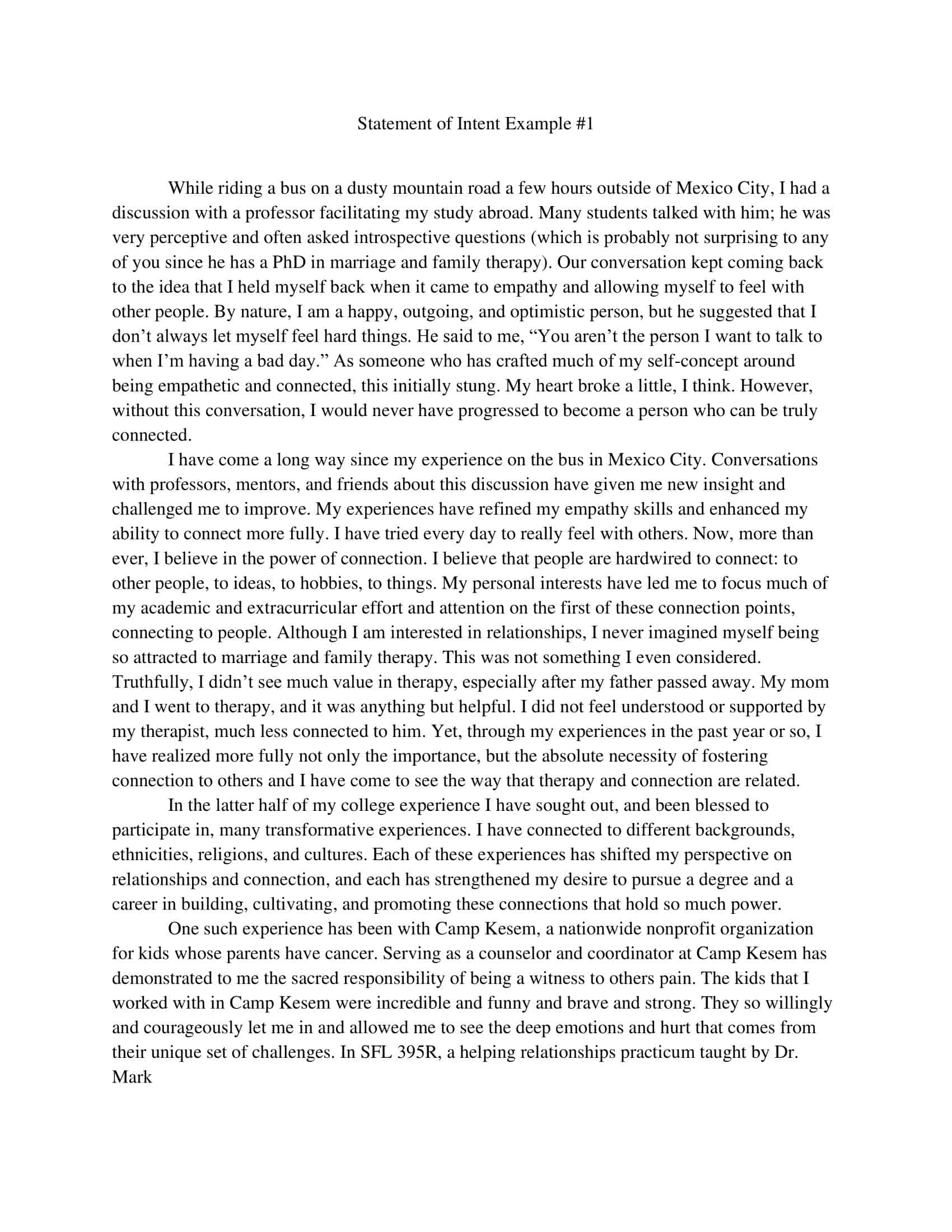



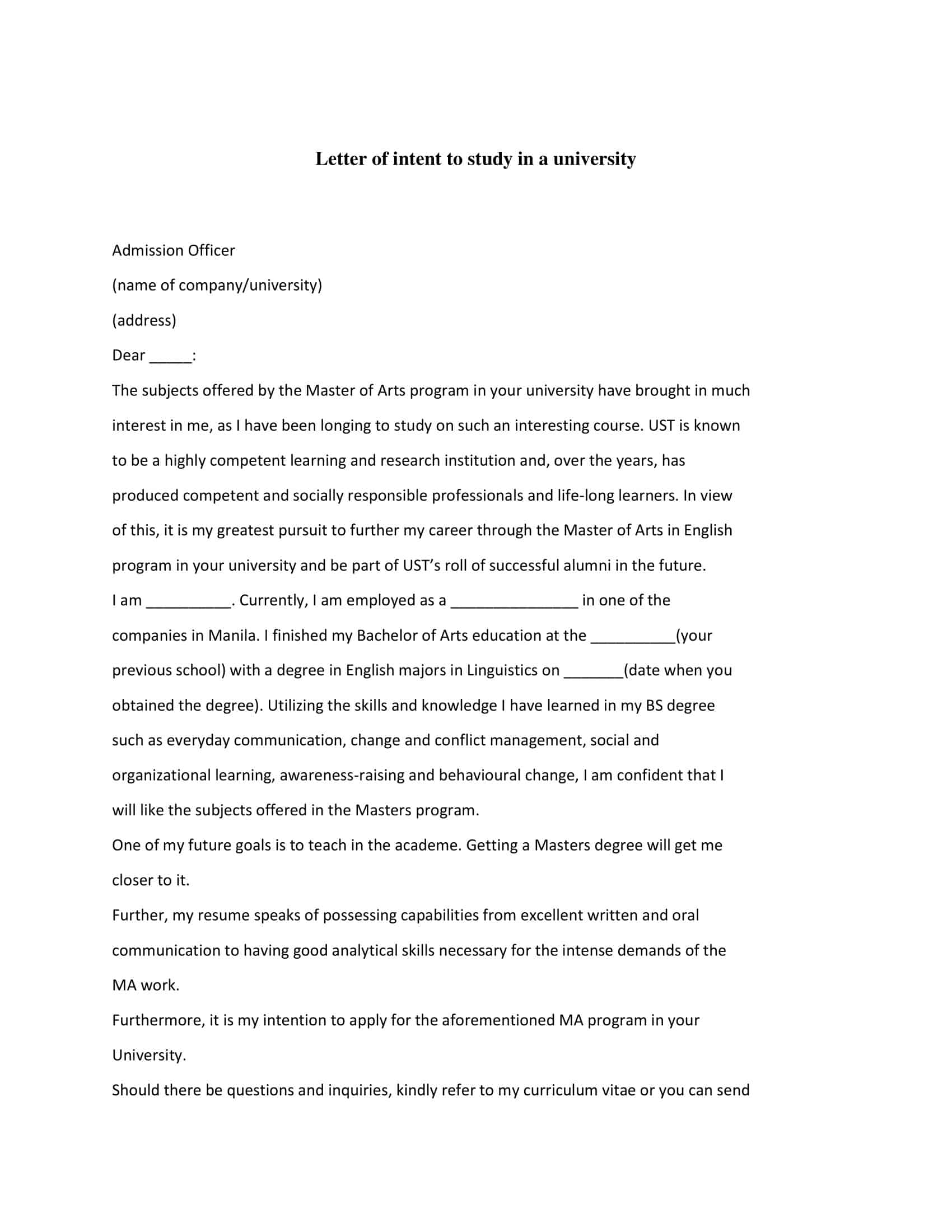



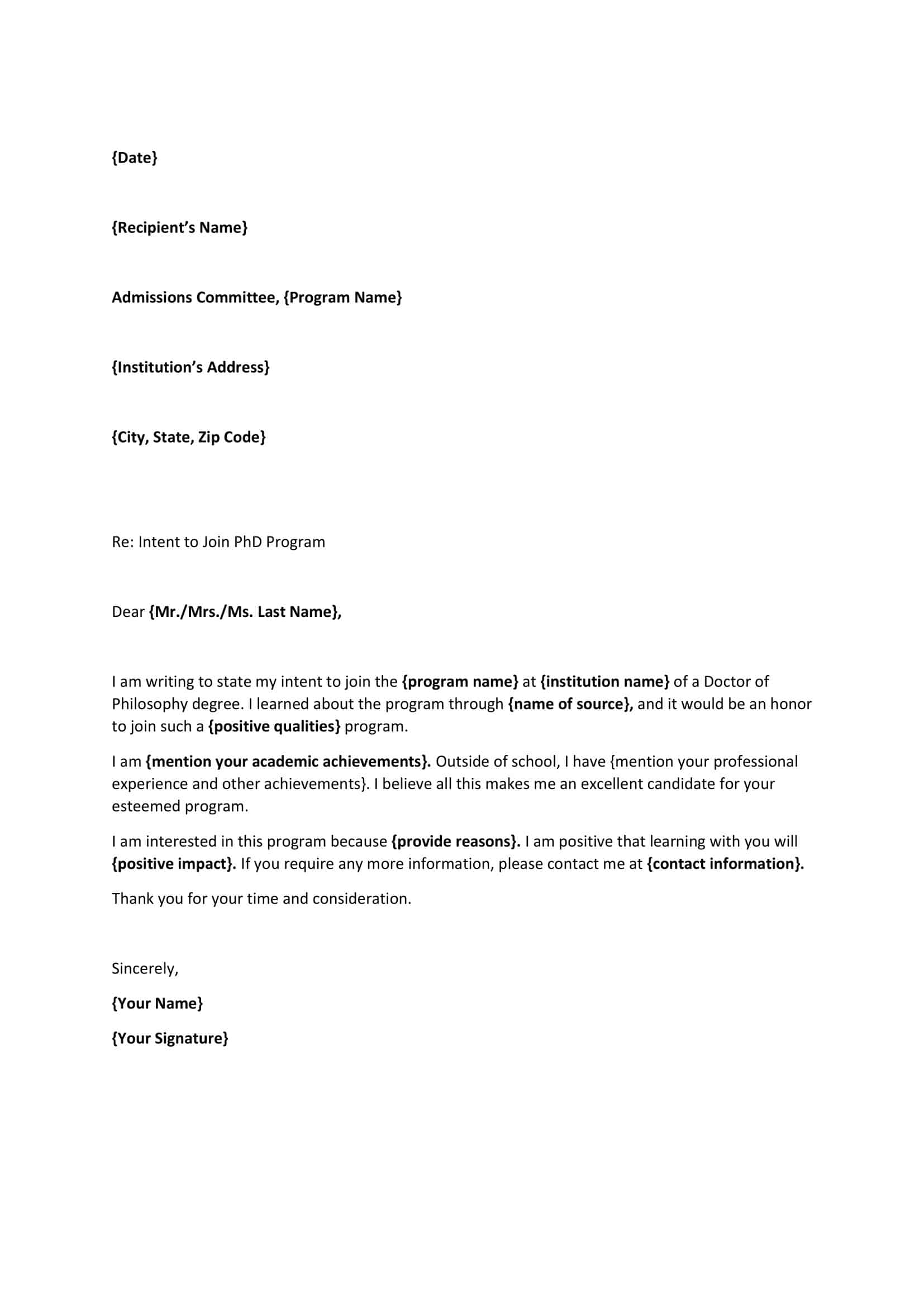
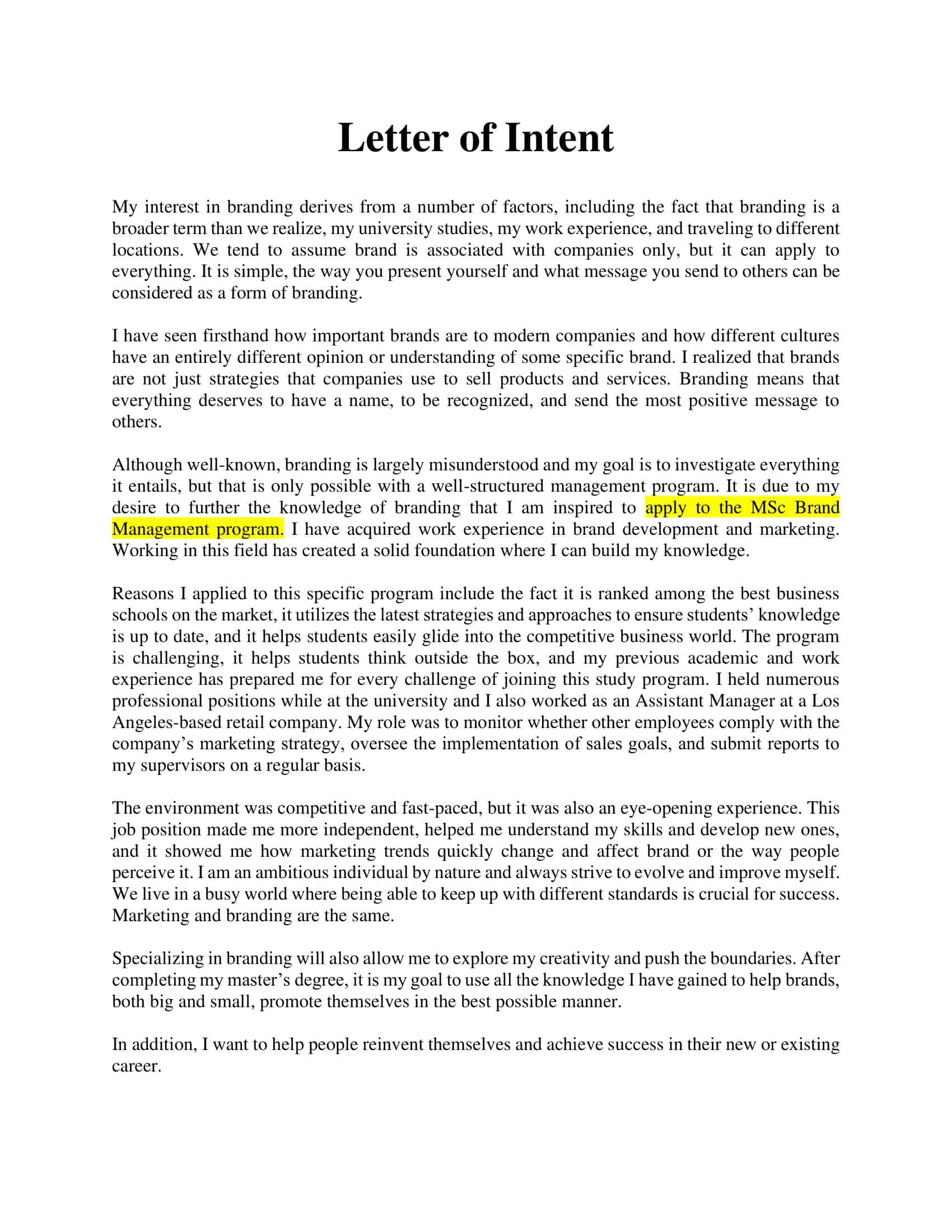

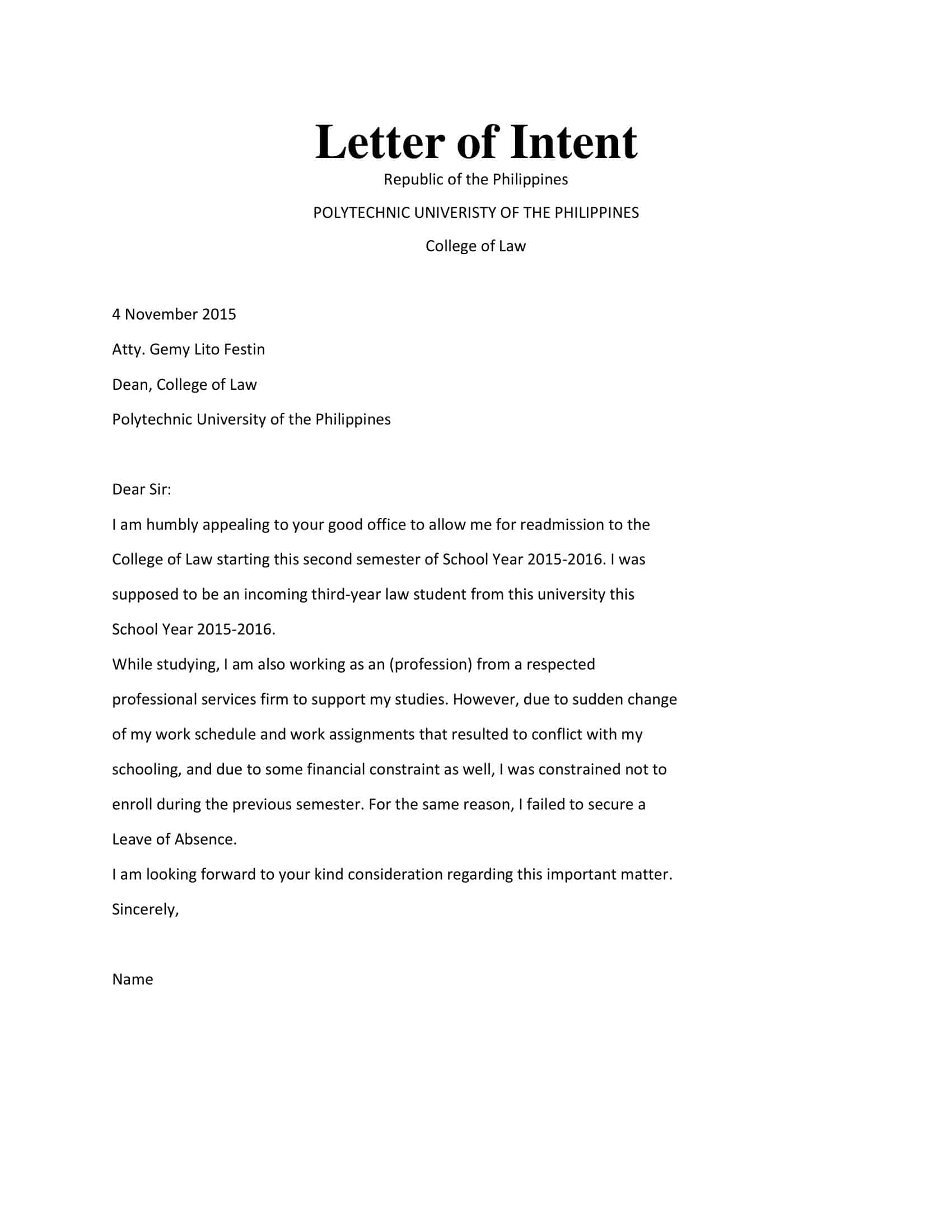
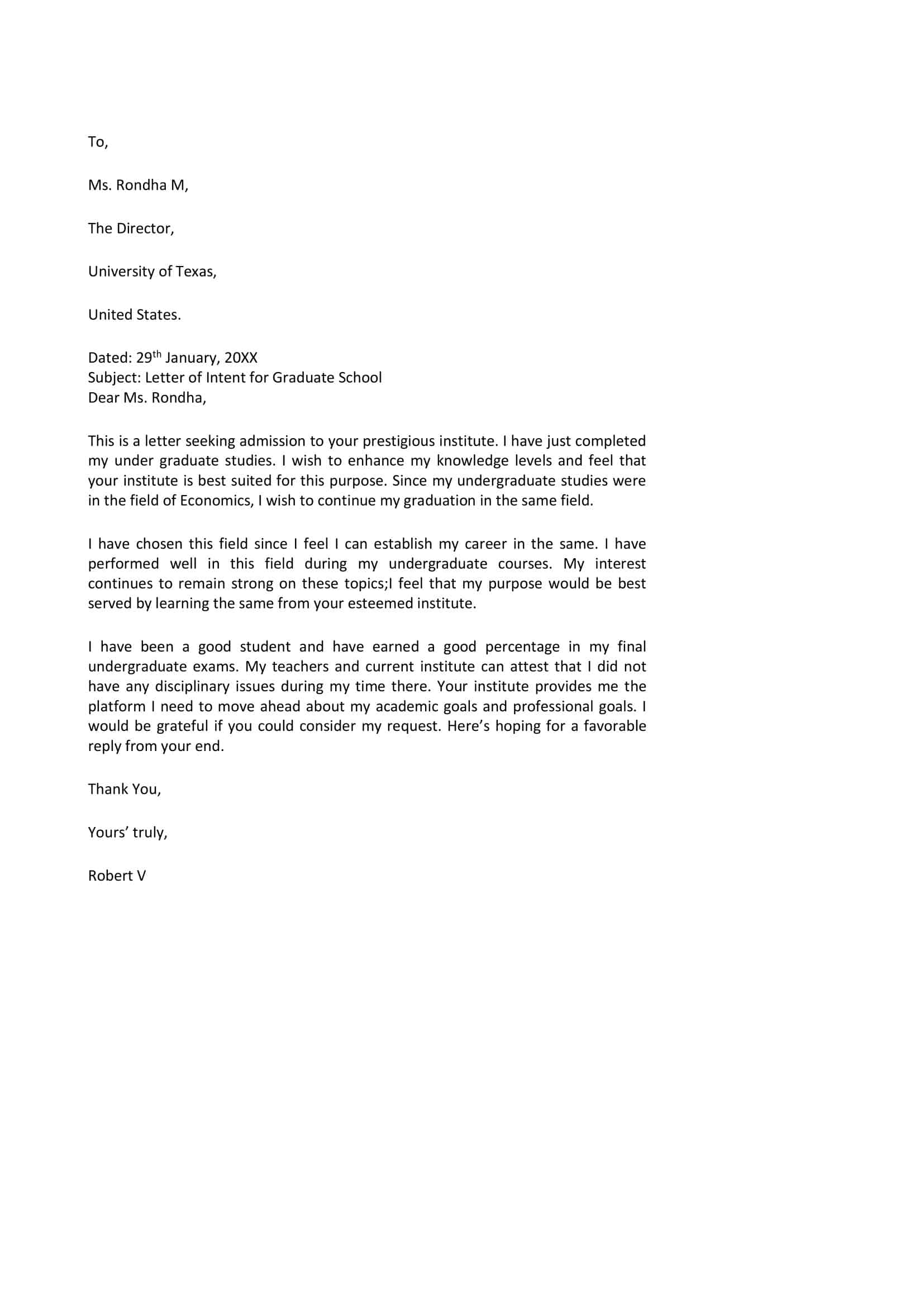
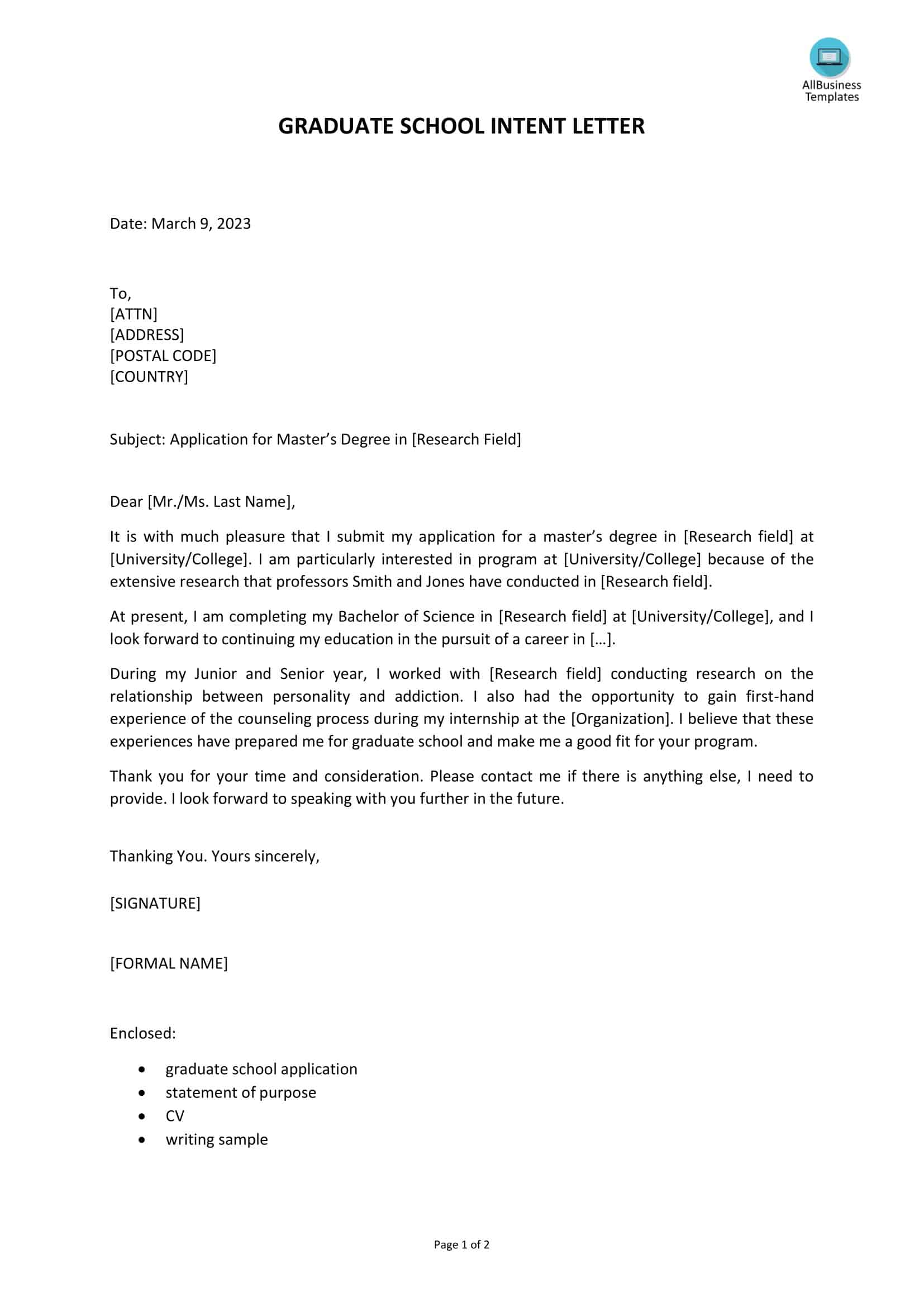



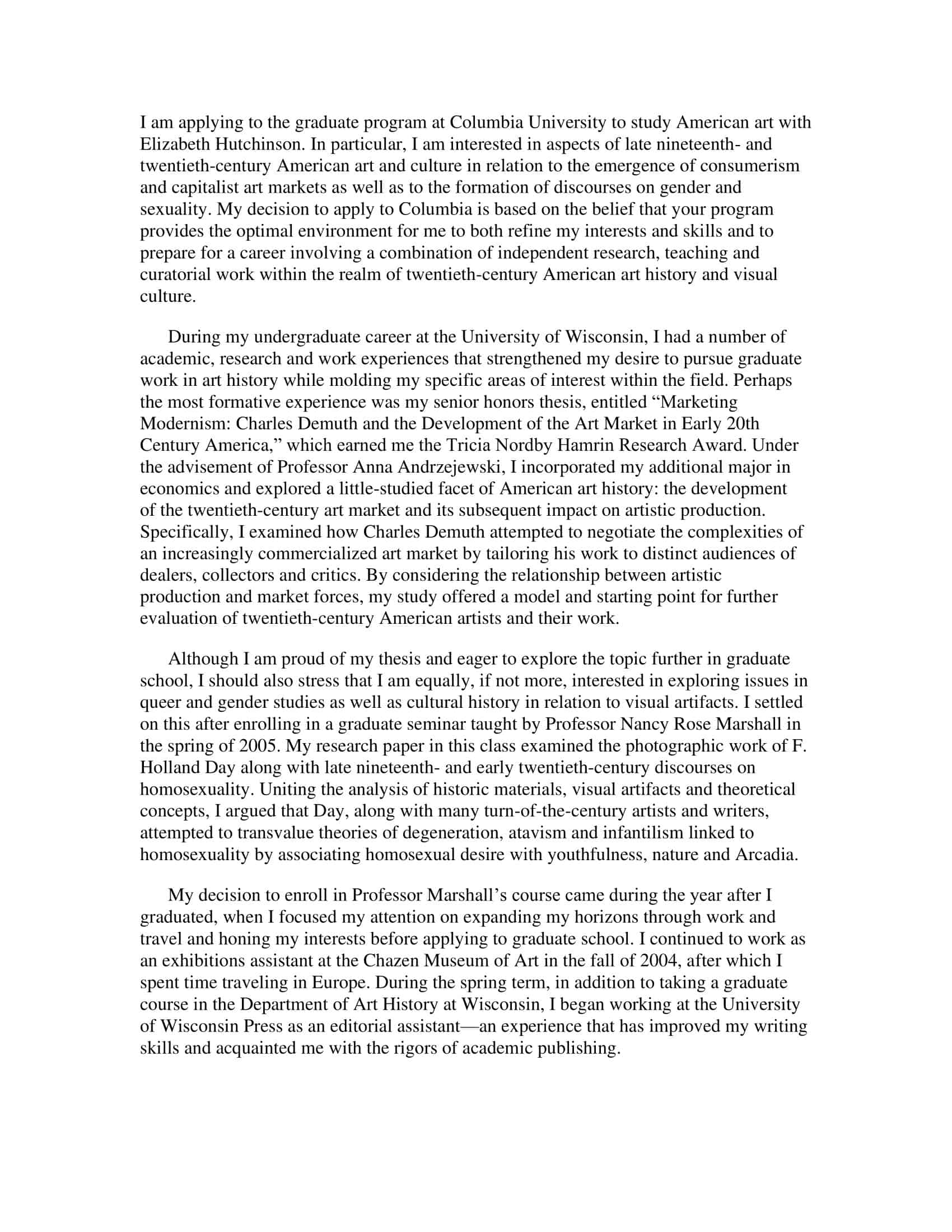

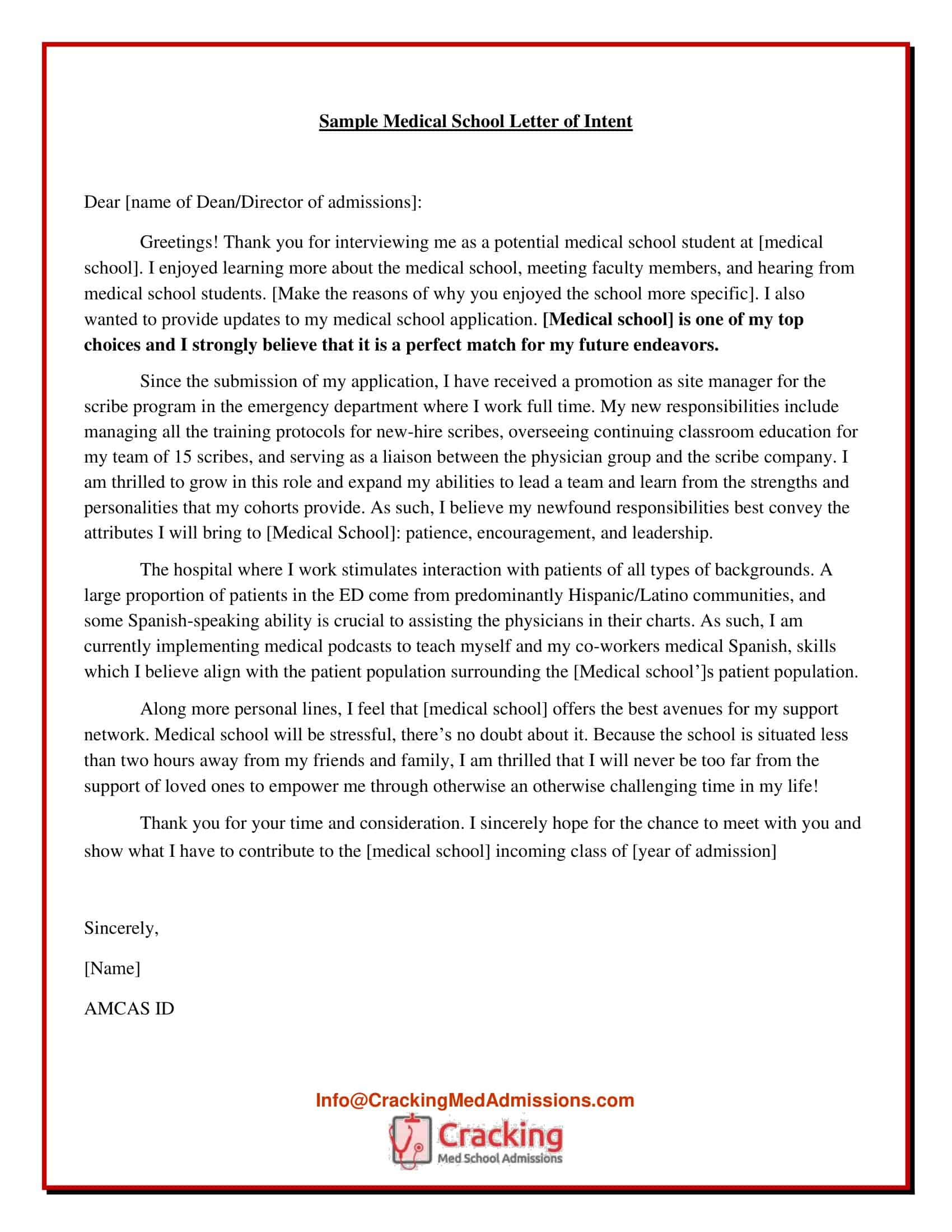

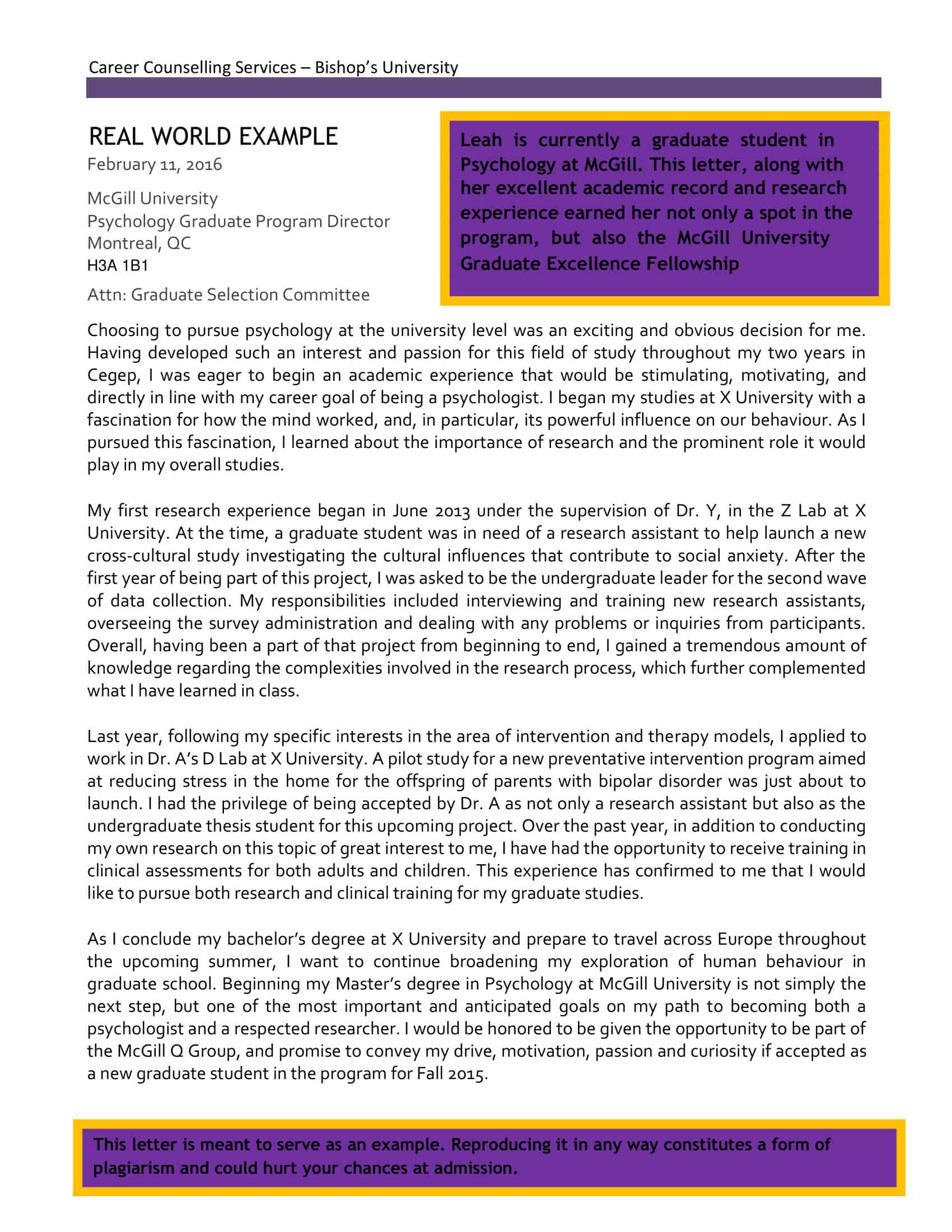
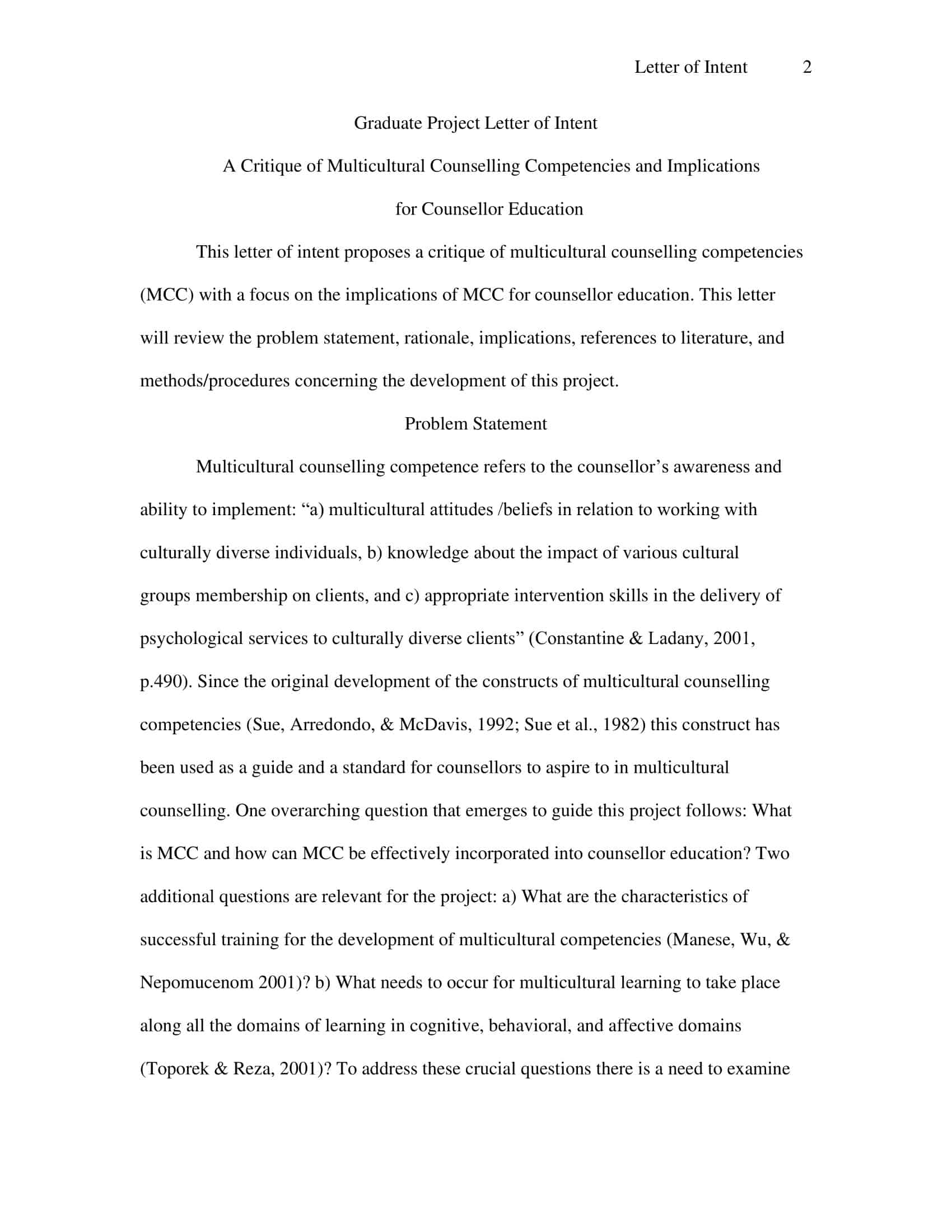















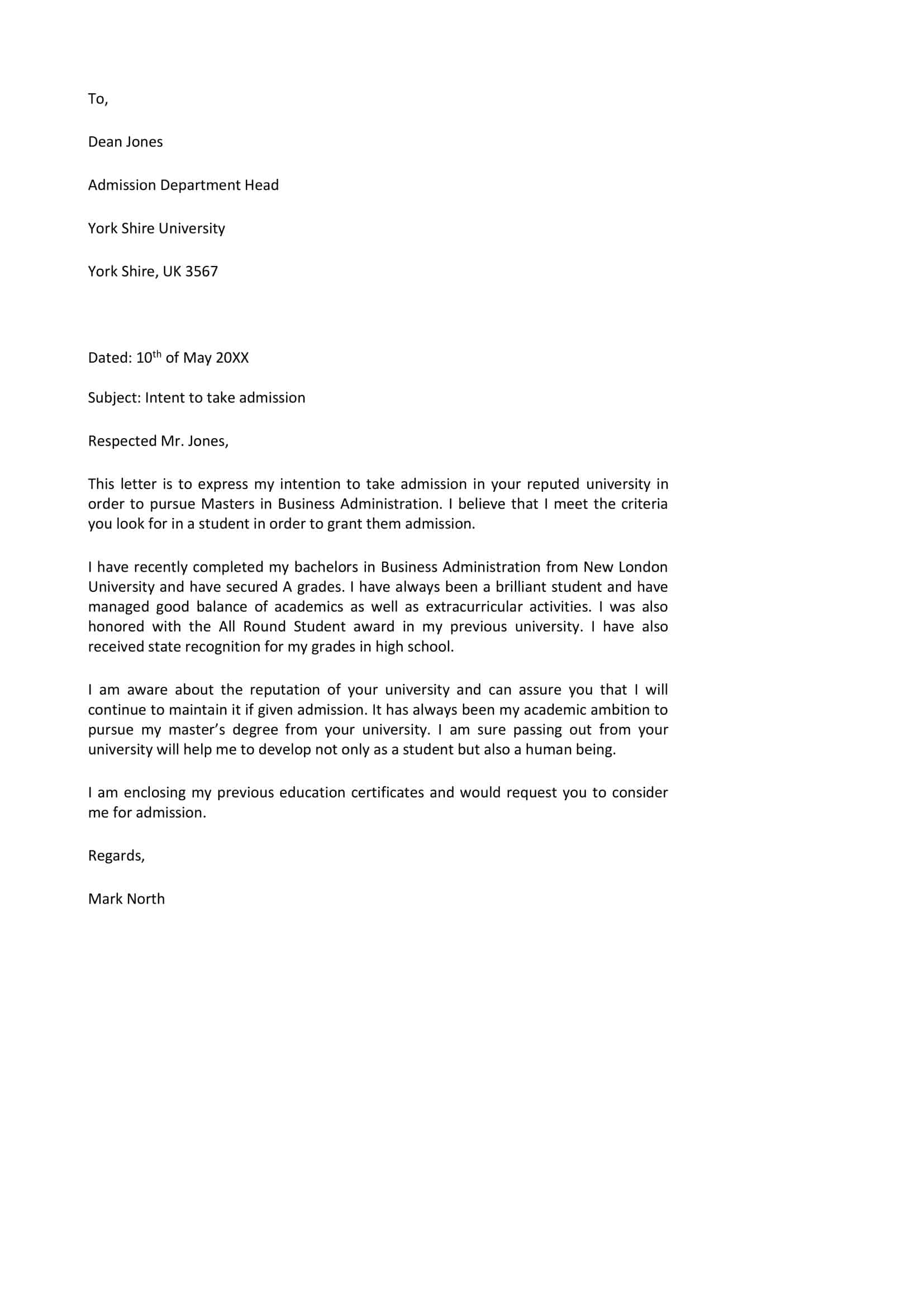


![Free Printable Friendly Letter Templates [PDF, Word, Excel] 1st, 2nd, 4th Grade 1 Friendly Letter](https://www.typecalendar.com/wp-content/uploads/2023/05/Friendly-Letter-150x150.jpg 150w, https://www.typecalendar.com/wp-content/uploads/2023/05/Friendly-Letter-1200x1200.jpg 1200w)
![43+ Printable Leave of Absence Letter (LOA) Templates [PDF, Word] / Free 2 Leave of Absence Letter](https://www.typecalendar.com/wp-content/uploads/2023/01/Leave-of-Absence-Letter-150x150.jpg 150w, https://www.typecalendar.com/wp-content/uploads/2023/01/Leave-of-Absence-Letter-1200x1200.jpg 1200w)
![Free Printable Roommate Agreement Templates [Word, PDF] 3 Roommate Agreement](https://www.typecalendar.com/wp-content/uploads/2023/06/Roommate-Agreement-150x150.jpg)
